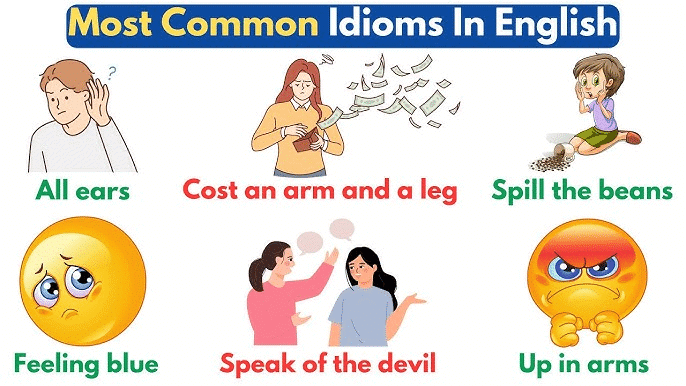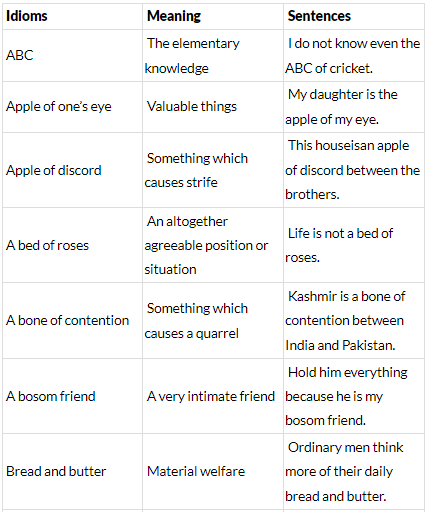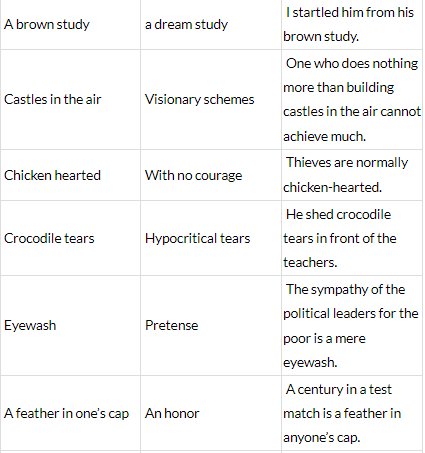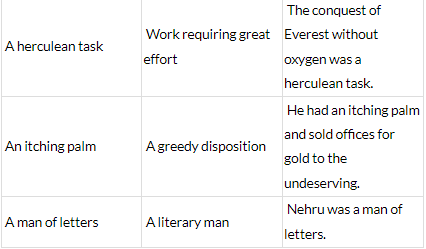Phrases | English Grammar Class 5 PDF Download
| Table of contents |

|
| Phrases |

|
| Types of Phrases |

|
| How to Use Phrases Effectively |

|
| Idiom |

|
| What are idioms? |

|
Phrases
A Phrase is a group of words that work together to convey a particular meaning but do not form a complete sentence because they lack a subject or a verb. Phrases function as a single part of speech within a sentence and can act as nouns, verbs, adjectives, or adverbs.

Types of Phrases
Noun Phrase
A group of words that functions as a noun in a sentence.
- It adds more detail about the noun, making sentences specific and informative.
- Example: The tall building is impressive.

Verb Phrase
A combination of a main verb and its auxiliaries (helping verbs) within a sentence.
- It helps in forming tenses, moods, and voices of verbs.
- Example: She has been reading for hours.

Adjective Phrase
A group of words that describes a noun or pronoun in a sentence.
- It provides extra information about the qualities of a noun or pronoun.
- Example: The cake with chocolate icing was delicious.

Adverb Phrase
A group of words that modifies a verb, an adjective, or another adverb, indicating how, when, where, or why something happened.
- It adds details about the verb, adjective, or adverb it modifies.
- Example: He completed the assignment in a hurry.

Prepositional Phrase
A modifying phrase consisting of a preposition and its object.
- It often acts as an adjective or adverb.
- Example: The cat is under the table.

How to Use Phrases Effectively
1. To Add Description:
- Use adjective or adverb phrases to make your sentences more detailed.
- Example: The room with blue walls was very cozy.
2. To Show Purpose or Action:
- Infinitive phrases help convey intention.
- Example: She studies hard to achieve her dreams.
3. To Simplify Sentences:
- Phrases reduce the need for multiple sentences.
- Example: My friend, an excellent musician, won the competition.
Idiom
Idioms are words, phrases, or expressions that are either grammatically unusual. Example: “Long time, no see !”, or their meaning cannot be taken literally. Example: “It’s raining cats and dogs!” This expression does not mean that cats and dogs are falling from the sky, but it is a metaphorical expression (word picture) that means that it is raining very heavily.
What are idioms?
An Idiom (also called idiomatic expression) is an expression, word, or phrase that don’t mean exactly what the words say. They have, however, hidden meanings.Idioms are phrases that mean something different than what the words say.
Example:
- Time flies quickly when I’m swimming in the pool.
- Of course, clocks don’t have wings and time can’t fly through the air.
- Time flies is an idiom that means time goes by quickly.
Idioms with Meanings and Sentences


|
37 videos|367 docs|53 tests
|
FAQs on Phrases - English Grammar Class 5
| 1. What are the different types of phrases in English? |  |
| 2. How can phrases enhance writing and communication? |  |
| 3. What are idioms, and how do they function in language? |  |
| 4. How can I effectively use idioms in my writing? |  |
| 5. Can phrases and idioms improve my speaking skills in English? |  |




















